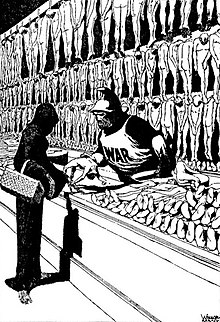User:GregoryMGalvin/sandbox
In the United States[edit]


Leading up to 1917 and the declaration of war against Germany, the labor unions, socialists, members of the Old Right, and pacifist groups in the United States publicly opposed participation,[1] the obvious motive for the 1916 Preparedness Day Bombing stemming from this. When Woodrow Wilson ran for reelection in 1916 on the slogan "He Kept Us Out of War", he received support from these groups (although the Socialist Party of America ran its own candidate, Allan Benson). After Wilson was reelected, though, events quickly spiraled into war. The Zimmermann Telegram and resumption of unrestricted submarine warfare by Germany provoked outrage in the U.S., and Congress declared war on April 6. Conscription was introduced shortly thereafter, which the anti-war movement bitterly opposed.
The Espionage Act of 1917 was passed to prevent spying but also contained a section which criminalized inciting or attempting to incite any mutiny, desertion, or refusal of duty in the armed forces, punishable with a fine of not more than $10,000, not more than twenty years in federal prison, or both. Thousands of anti-war activists and unhappy citizens were prosecuted on authority of this and the Sedition Act of 1918, which tightened restrictions even more. Among the most famous was Eugene Debs, chairman of the Socialist Party of the USA for giving an anti-war speech in Ohio. The U.S. Supreme Court upheld these prosecutions in a series of decisions. Conscientious objectors were punished as well, most of them Christian pacifist inductees. They were placed directly in the armed forces and court-martialed, receiving draconian sentences and harsh treatment. A number of them died in Alcatraz Prison, then a military facility. Vigilante groups were formed which suppressed dissent as well, such as by rounding up draft-age men and checking if they were in possession of draft cards or not.
Ben Salmon was a Catholic conscientious objector and outspoken critic of Just War theology. During World War I, America's Roman Catholic hierarchy denounced him and The New York Times described him as a "spy suspect." The US military (in which he was never inducted) court-martialed him for desertion and spreading propaganda, then sentenced him to death (this was later revised to 25 years hard labor).[2]
Around 300,000 American men evaded or refused conscription in World War I. Aliens such as Emma Goldman were deported, while naturalized or even native-born citizens, including Eugene Debs, lost their citizenship for their activities. Helen Keller, a socialist, and Jane Addams, a pacifist, also publicly opposed the war, but neither was prosecuted, likely because they were sympathetic figures (Keller working to help fellow deaf-blind people and Addams in charity to benefit the poor).
- ^ "World War 1 and the Suppression of Dissent". The Future of Freedom Foundation. Retrieved 22 November 2014.
- ^ Staff of the Catholic Peace Fellowship (2007). "The Life and Witness of Ben Salmon". Sign of Peace. 6.1 (Spring 2007).
{{cite journal}}: Cite has empty unknown parameter:|month=(help)
